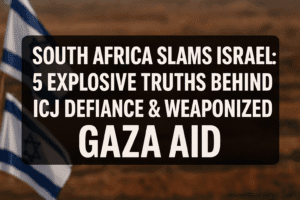South Africa Slams Israel: 5 Explosive Truths Behind ICJ Defiance & Weaponized Gaza Aid
South Africa Slams Israel: 5 Explosive Truths Behind ICJ Defiance & Weaponized Gaza Aid
South Africa’s top diplomat at The Hague has issued a damning indictment of Israel’s conduct in Gaza, declaring its defiance of the International Court of Justice (ICJ) not merely as non-compliance, but as an active perversion of justice. Ambassador Vusi Madonsela’s statements go beyond diplomatic reproach – they paint a picture of international law unraveling in real-time.
The Broken Promise of the ICJ:
Madonsela revealed a grim paradox: instead of curbing the humanitarian catastrophe, conditions in Gaza have deteriorated since South Africa’s landmark genocide case prompted the ICJ to issue provisional measures in early 2024. These measures ordered Israel to prevent genocidal acts, allow urgent aid, and punish incitement. “There is zero indication Israel intends to comply,” Madonsela stated bluntly. This isn’t just inaction; it’s a rejection of the court’s foundational authority.
Aid as a “Death Trap”:
The ambassador’s most chilling accusation centers on humanitarian operations. Israel’s control over aid distribution, he contends, has been cynically manipulated into a system that endangers rather than saves lives. By imposing arbitrary, obstructive protocols on aid delivery – despite the ICJ’s explicit order for unfettered access – Israel has turned survival mechanisms into instruments of suffering. This systemic throttling of essentials (food, water, medicine) under the guise of security, Madonsela argues, directly violates the court’s intent and accelerates civilian harm.
The “Humanitarian City” Mirage:
The proposed Israeli/US plan for a “humanitarian camp” in Rafah drew particularly fierce condemnation. Madonsela dismissed it as “a concentration camp by another name,” emphasizing its incompatibility with the ICJ’s advisory opinion demanding an end to occupation. Forcing displaced Palestinians into confined zones without freedom of movement or a clear path to return, he argued, isn’t humanitarianism – it’s coerced ghettoization, contradicting the very spirit of international law the ICJ sought to uphold.
Why This Defiance Matters Globally:
Madonsela’s critique transcends the Gaza conflict. It strikes at the heart of a fragile international order:
- The Enforcement Vacuum: The ICJ lacks its own enforcement power. Its rulings rely on UN Security Council action – which remains paralyzed by vetoes. Israel’s open defiance, without significant consequence, sets a dangerous precedent for powerful states.
- Erosion of Trust: When binding provisional measures are ignored as conditions worsen, it signals to vulnerable populations that the world’s highest court cannot protect them. This erodes global faith in multilateral institutions.
- Accountability in Crisis: South Africa’s stance underscores a painful reality: without tangible pressure or sanctions from the broader international community, even the clearest legal rulings remain words on paper. Madonsela noted the international community’s own belief that adherence to the ICJ measures could have prevented Gaza’s current devastation.
The Human Cost of Legal Failure:
Ultimately, Madonsela’s statements refocus attention where it belongs: on the Palestinian civilians trapped in this legal and political collapse. The refusal to implement the ICJ’s measures isn’t an abstract legal dispute; it translates directly into prolonged starvation, preventable disease, and ongoing trauma for millions. South Africa positions its case not just as a legal argument, but as a desperate plea for a functional system of human protection that currently does not exist.

You must be logged in to post a comment.